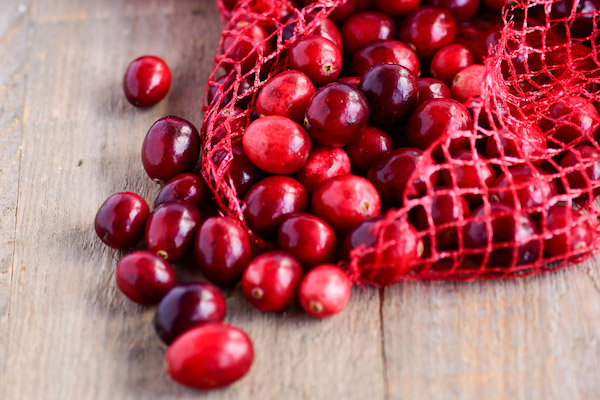Ruby red and rich in anti-oxidant and anti-inflammatory compounds

With Thanksgiving just behind us, chances are good you’ve had a meal with cranberries on the table. But maybe we ought to bring out these ruby red gems more often when you consider their multiple health benefits.
Interestingly, the common variety of cranberry (Vaccinium macrocarpon) is one of the few commercial fruits native to North America. It’s grown in low, boggy soil, where sometimes fields are flooded to ease harvesting. Native Americans used them for food, dye, and medicine. Sailors once used them to prevent scurvy.
Today we know cranberries are packed with vitamins, anti-aging anti-oxidants, and anti-inflammatories. They contain ample amounts of Vitamin C, Vitamin E, Manganese, Copper, and Vitamin K1, and both insoluble and soluble fiber. But it’s the anti-oxidants like quercetin, myricetin, peonidin, ursolic acid, and proanthocyanidins that truly make them a superfood.
Super Health Benefits
Studies have found the phytonutrients in cranberry can have multiple effects on the body, involving the skin, arteries, urinary tract, digestive tract, and cellular metabolism.
Heart Health – The anti-inflammatories in cranberry can help prevent the build-up of plaque in blood vessels (atherosclerosis), which can prevent or delay the onset of heart disease. Cranberry inhibits LDL cholesterol, triglycerides, and insulin resistance, which could benefit both heart disease and non-alcoholic fatty liver.
Age-related Damage – Oxidative damage is thought to be the leading cause of aging and a contributor to multiple heath problems, including diabetes and cancer. The antioxidants contained in cranberries minimize this cascade.
Digestion – The phytochemicals in cranberries inhibit the growth of Helicobacter pylori, a bacteria associated with ulcers. Ingesting cranberries has been shown to improve gut bacteria, and inhibit bile acid production, which is associated with colon and gastrointestinal cancers.
Urinary Tract Infections – This is probably the best-known benefit of ingesting cranberries. The proanthocyanidins in cranberries prevent bacteria from attaching to the urinary tract lining, preventing infections.
Antibiotic Resistance – A new study tested bacteria responsible for urinary tract infections, pneumonia, and gastroenteritis that typically become resistant to antibiotics. Scientists found that adding cranberry extract prevented the resistance from happening. The extract made the bacterial cell walls more permeable to the antibiotics, allowing them to be more effective.
Prevent Infection – Studies show that cranberries can fend off norovirus, a common cause of food poisoning.
Things to consider
Because cranberries contain high amounts of Vitamin K2, which clots the blood, people taking blood thinners should take only small amounts of cranberry.
Cranberry consumption may increase your likelihood of creating oxalate kidney stones, but decrease the risk of other types of kidney stones because it can lower pH of urine.
Cranberry juice obviously contains no insoluble fiber and may be mixed with a lot of sugar. Choose your juice wisely.
REFERENCES



